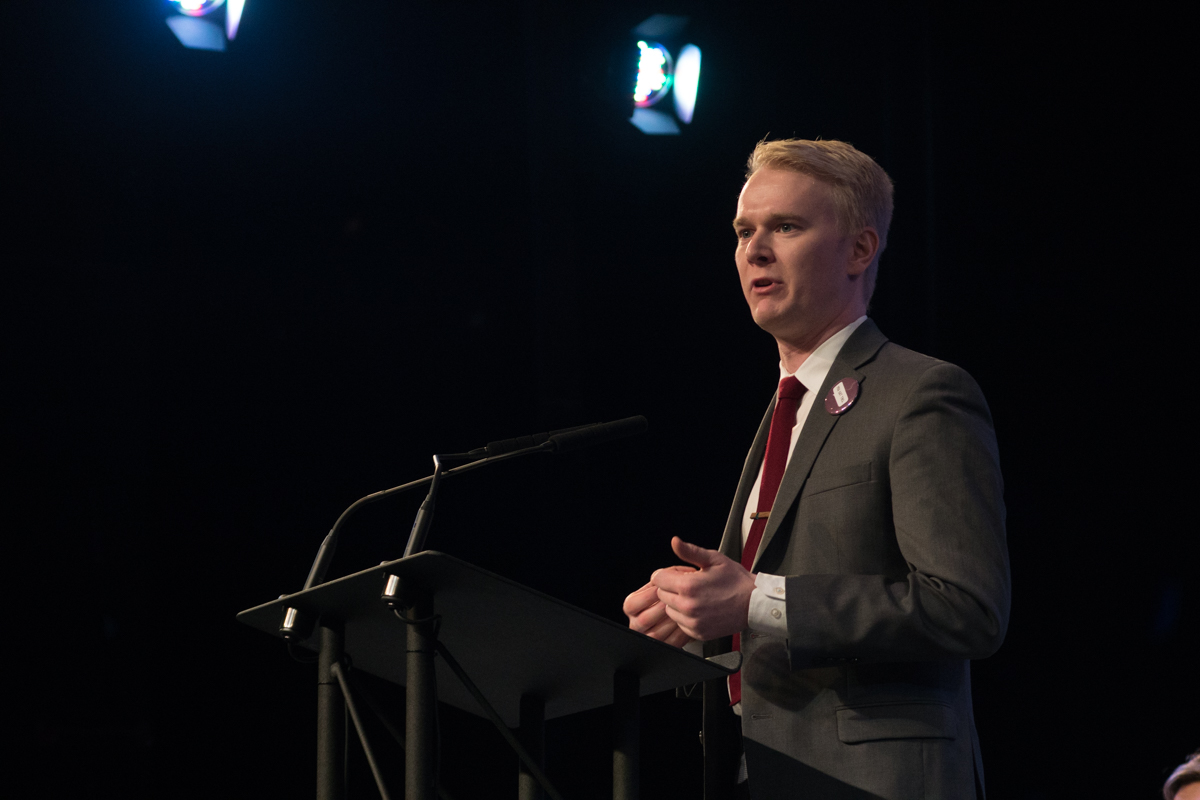 Oumar Salifou
Oumar Salifou Each year, The Gateway publishes an evaluation of the Students’ Union executive and the Board of Governors representative. It’s impossible to discuss every aspect of their tenures, so these reports are largely based on the major components of the platform each executive campaigned on, and the most significant responsibilities of their respective positions. These evaluations were informed by interviews with the executives themselves. The grading rubric can be found below. And if you’re short for time, check out our TLDR for a bite-sized breakdown.
Reed Larsen: B
If there’s anyone out of the executive who’s going to be the most visible, it’s the president. They’re the figurehead for the executive, as well as Students’ Council, primarily working on bringing the efforts of the executive team together, and acting as students’ main representative in many advocacy capacities. Larsen’s done well this year keeping things chugging along, but some of his goals have fallen a bit flat or need more time to develop.
One of Larsen’s chief goals this year was to continue work on the Student Charter of Rights, an initiative started by previous president Marina Banister. While last year Banister headed research into what the document should contain, Larsen began writing a white paper of the Charter this January, and hopes for it to be published by the end of February. After the publishing of the white paper, Larsen notes that the next steps need to be establishing a committee to implement the Charter, as well as talking to the Dean of Students and the university provost. Students will have to wait and see what the white paper contains to see what protections for them it entails, and the establishment of the Charter’s principles still requires a dedicated president for next year that will take on the project.
In regards to affordability for students, Larsen campaigned on increasing upfront grants for students, which he sees as the next step to improving affordability after the passing of Bill 19. Alongside this being an election cycle priority for the Council of Alberta University Students (CAUS) — which Larsen sits on — he has been talking directly with the government relations office at the U of A to figure out how to push this messaging during the election cycle, using messaging and forums. It’s good to see Larsen capitalizing on the election cycle even after Bill 19’s passing — after all, so much work still needs to be done in regards to postsecondary affordability.
Larsen has been a long-term advocate for tenant rights for campus residents — it’s something he campaigned on during his run for vice-president (external) in 2017 and attempted to work on more this year. Little was accomplished on tenant’s rights last year, and not much has changed this time around. Larsen notes the difficulty of finding an MLA to champion the cause on behalf of students, and says that third-party supports, such as labour rights groups, should be the next avenue to look at. Given Larsen’s foresight with the difficulty of championing this cause, I wonder why some of these suggestions weren’t followed through with this year.
Last year’s Bill 5 controversy seriously harmed relations between the SU and Indigenous students, and Larsen has been working to repair these relationships. Bill 3 was passed in Students’ Council this year to repeal Bill 5, and Larsen has been trying to have more friendly relations with Indigenous students by attending Indigenous student events, as well as working to support the Aboriginal Student Council referendum, which is being voted on in this year’s upcoming elections. Larsen and his team certainly have seemed more open to reworking council’s systems to better accommodate Indigenous voices, but this work is only a start. Continued engagement and discussion will need to happen in the years going forward.
TLDR: Larsen has started good work on many of his campaign points, such as working to increase upfront grants for students, the Student Charter of Rights. He has slipped a bit in regards to tenant rights, though, and the work on reconciliation that Larsen and Students’ Council have done this year will need to be seriously re-considered and pushed forward.
Rubric:
A-range: This person has fulfilled the promises they campaigned on, has created tangible change during their tenure, and has shown a commitment to improving the lives of students. Their GPA is looking good.
B-range: This person has done their job consistently well, but has not made any remarkable changes, or has fallen short on important goals they set out in their platforms. They’re doing fine, but it’s nothing to phone home about.
C-range: This person has done their job sufficiently, but has failed to make significant progress in the areas most relevant to their portfolio, or has essentially abandoned a major part of their platform. They’re still passing with a safe buffer though, and Cs get degrees!
D-range: This person has done a very lacklustre job, and has not sufficiently fulfilled their campaign promises or the responsibilities of their position.
F-range: This person has not done their job, has not represented students, and has not fulfilled their campaign promises whatsoever.




